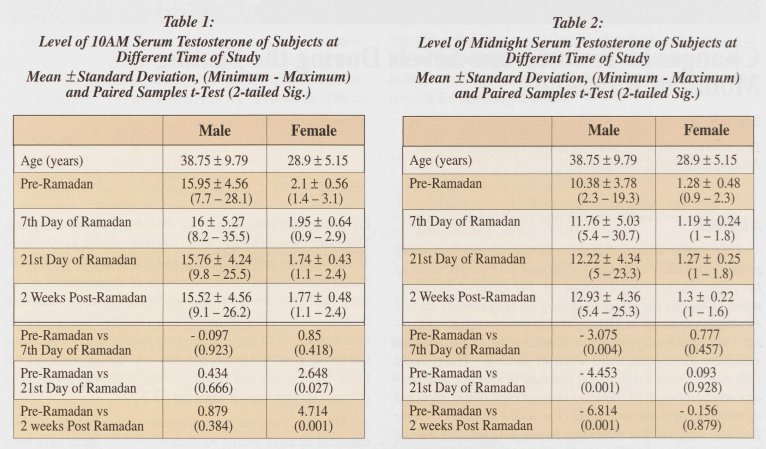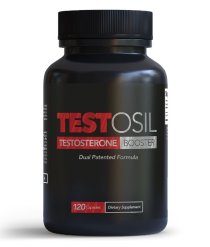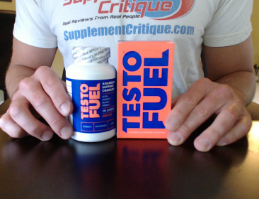Intermittent Fasting And Testosterone: What’s The Effect?
By: Rob MillerContents
Does Intermittent Fasting Impact Testosterone?What is Intermittent Fasting?
Types Of Intermittent Fasting
16 On / 8 Off Schedule
24 Hour Schedule
Benefits Of Intermittent Fasting
Can Women Intermittent Fast?
The Bottom Line
References
If you haven’t heard of intermittent fasting then you’ve been living under a rock for the past few years. Celebrated as a safe and effective way to increase weight loss while improving overall health, intermittent fasting has become the subject of the question:
Can intermittent fasting be a potential way to increase testosterone levels?
Let’s review what intermittent fasting is, benefits of intermittent fasting, and what science has to say about intermittent fasting increasing your testosterone levels.
Does Intermittent Fasting Impact Testosterone?
Intermittent fasting MAY boost testosterone levels but studies are mixed.
In my opinion, I’d suggest most of the studies are leaning towards the negative. While some studies suggest that short term fasting may increase testosterone levels, there are also studies that say the exact opposite.
For example, a very popular study looked at men and women during Ramadan where people had to abstain from food from sunrise to sunset. Men who fasted during these hours but ate something immediately after sun down saw a temporary improvement in testosterone.
You can see the results of this study in the table below:

Alternatively, men who continued to fast after sunset saw a decrease in testosterone.
In that same study, women saw decreases in testosterone and researchers suggested that fasting may be an ideal way for women with high testosterone levels to decrease their t-levels.
Let’s not forget that men and women had to also abstain from sex. Studies suggest that abstinence may temporarily increase testosterone levels. (Source)

In short, there were a variety of factors at play here, including the fasting taking part as a part of a holiday and not a daily routine. The numerous variables make it difficult to determine the exact cause of the small and temporary boost in t-levels.
A very recent study published in the Journal of Translational Medicine placed resistance trained men on the 16:8 fasting schedule. At the conclusion of the study, all subjects had lower levels of testosterone and IGF-1. The bright side of the study was that subjects did not lose any muscle tissue. (6-8)
What is Intermittent Fasting?
Intermittent fasting is a way of timing your meals to maximize the benefits associated with the act of refraining from eating for a specific period of time.
Intermittent fasting isn’t about randomly avoiding food for a few hours then eating at sporadic times; rather, it is a set schedule of fasting with a feeding window. There are two common types of intermittent fasting that have been getting a lot of positive attention in the fitness industry.
Types of Intermittent Fasting
I’ll list the two types of intermittent fasting in the order that I would recommend trying them. If you’re able to adjust to and successfully perform the first type (16:8) after a month or so then I’d suggest trying the second type (24). From here, you’ll be able to see which one works better for you, your schedule, and your health benefits.
16 On / 8 Off Schedule
The 16:8 schedule requires you to fast for 16 hours each day and then follow your normal diet during an 8-hour feeding window. For those who are just starting out with intermittent fasting, there is the option of performing the 16:8 schedule five days per week, eventually moving up to fasting every day of the week.
While you can begin your feeding window at a time most convenient for you, most practitioners of intermittent fasting find it to be easiest to begin their fast at 8 p.m. and conclude the fast at 12 p.m. the next day. From 12 p.m. to 8 p.m., you would have the opportunity to eat. Once your feeding window expires, you would begin fasting again. During your fast, you are allowed to drink water and calorie-free beverages such as black coffee and tea.
Studies have demonstrated that the 16:8 schedule is an effective way to increase fat loss, maintain muscle mass, and improve certain health markers such as cardiovascular health. Below, I’ll expand more on these benefits and what happened to testosterone levels.
24 Hour Schedule
As the name implies, you refrain from consuming calories for an entire 24-hour period. Normally, this type of fast would be performed once or twice per week. While this may seem easier than the 16:8 schedule, many beginners find it difficult to abstain from food for an entire day and then have to make it through the night without food. This is why I recommend starting with the 16:8 schedule, allowing your body to adjust to fasting, then trying the 24-hour schedule.
Just like with the 16:8 schedule, you can begin your 24-hour fast at any point but most begin at 8 a.m. or 9 a.m. You would not consume any calories during this time except for water and calorie-free beverages such as black coffee and tea. Once 8 a.m. or 9 a.m. arrives again, follow your normal diet.
Studies have demonstrated that using the 24-hour schedule is a great way to promote a healthy weight management while reducing certain cardiovascular risk factors such as high cholesterol.
It should be noted that researchers mentioned how it would be equally as effective to simply cut your calories every day as opposed to abstaining from eating for a 24-hour period. Let’s jump into more details about the benefits of intermittent fasting.
Benefits of Intermittent Fasting
Fat Loss
If there is one benefit of intermittent fasting that has been proven time and time again, it’s fat loss. Whether you’re following a 16:8 schedule or fasting for 24 hours, both meal timing methods have been shown in a variety of animal and human-based studies to be effective at decreasing body fat. During intermittent fasting, the body switches over to using stored fat as fuel as opposed to important fuel sources such as muscle glycogen. (1–2)
EPOC Levels
Continuing with the idea above, performing a fasted workout has been shown to be incredibly effective at utilizing stored body fat for energy. Combining intermittent fasting with high intensity interval training can also help to spike EPOC (excess post oxygen consumption) levels. After exercise, your body has an oxygen debt that it must restore. In order to do so, it needs to continue burning calories and fat. The greater your EPOC levels, the more calories you’ll burn. (1-2)
Muscle Building
Worried about burning too many calories and losing lean muscle mass? Don’t be. Studies show that intermittent fasting triggers fat loss without the risk of losing muscle mass. What’s more, intermittent fasting may be an excellent way to promote lean muscle gains due to its anti-catabolic properties and spiking of growth hormone levels. (9)
Inflammation
Interestingly, intermittent fasting has been shown to be an anti-inflammatory agent, helping to reduce disease causing inflammation throughout the body. What’s more, it is suggested that intermittent fasting may reduce inflammation and therefore spike recovery rates post-workout. (3)
Brain Health
Intermittent fasting has also been shown to support brain health. Abstaining from food for 16 to 24 hours, depending on the schedule you choose, may be able to boost brain health and dramatically decrease the risk of illnesses such as Alzheimer’s. (4)
Longevity
Continuing with the idea above, intermittent fasting may significantly lower your risk for a number of diseases including cardiovascular disease and heart disease. (5)
Women and Intermittent Fasting
While intermittent fasting does present an impressive set of health benefits outside of testosterone, for women these benefits may come at a cost.
One concern that experts agree on is how intermittent fasting can impact the hormonal levels and fertility cycles of women. Studies show that fasting can disrupt hormonal levels to the point where women begin missing their menstrual cycles and this is a big problem, especially if you’re a woman who wants children in the future.
Let’s say that you’re a woman who has no plans to have kids, intermittent fasting may still not be for you because of the potential hormonal disruptions. For example, a significant drop in estrogen can seriously impact your mood, metabolic rate, and overall health.
With all that said, women can utilize intermittent fasting but perhaps not the systems that I mentioned above. There is another fasting methodology that is considered fasting but does not involve cutting out all foods for a specific amount of time. Rather, your day will be based on very low calorie consumption.
The 5:2 intermittent fasting system involves eating normally for five days a week and eating a very low-calorie diet for two consecutive days per week. On the two days you eat fewer calories, you want to consume around 600 calories. Time is not an issue. You can consume those calories in one big meal; however, must people find that it is easier to break up the calories into three 200 calorie meals.
Intermittent Fasting and Testosterone: The Bottom Line
Due to the conflicting research that is out there, I cannot confidently say that intermittent fasting is effective at increasing testosterone on a long-term basis. It may increase fat loss and protect muscle mass but if your goal is testosterone then it may not be effective.
With that said, using intermittent fasting in conjunction with testosterone boosting activities such as heavy weight lifting and using testosterone supplements may allow you to reap the benefits of fat loss, muscle building, and testosterone boosting.
References
- Heilbronn LK, Smith SR, Martin CK, Anton SD, Ravussin E. Alternate-day fasting in nonobese subjects: effects on body weight, body composition, and energy metabolism. Am J Clin Nutr. 2005 Jan;81(1):69-73.
- Johnson JB, Summer W, Cutler RG, Martin B, Hyun DH, Dixit VD, Pearson M, Nassar M, Telljohann R, Maudsley S, Carlson O, John S, Laub DR, Mattson MP. Alternate day calorie restriction improves clinical findings and reduces markers of oxidative stress and inflammation in overweight adults with moderate asthma. Free Radic Biol Med. 2007 Mar 1;42(5):665-74. Epub 2006 Dec 14.
- Peart, Karen N. “Anti-Inflammatory Mechanism of Dieting and Fasting Revealed.” YaleNews, 16 Feb. 2015, news.yale.edu/2015/02/16/anti-inflammatory-mechanism-dieting-and-fasting-revealed.
- Van Praag, Henriette et al. “Exercise, Energy Intake, Glucose Homeostasis, and the Brain.” The Journal of Neuroscience 34.46 (2014): 15139–15149. PMC. Web. 14 Nov. 2017.
- Aly SM. Role of Intermittent Fasting on Improving Health and Reducing Diseases. International Journal of Health Sciences. 2014;8(3):V-VI.
- Mesbahzadeh B, Ghiravani Z, Mehrjoofard H. Effect of Ramadan fasting on secretion of sex hormones in healthy single males. East Mediterr Health J. 2005 Sep-Nov;11(5-6):1120-3.
- Klibanski A, Beitins IZ, Badger T, Little R, McArthur JW. Reproductive function during fasting in men. J Clin Endocrinol Metab. 1981 Aug;53(2):258-63.
- Moro T, Tinsley G, Bianco A, et al. Effects of eight weeks of time-restricted feeding (16/8) on basal metabolism, maximal strength, body composition, inflammation, and cardiovascular risk factors in resistance-trained males. Journal of Translational Medicine. 2016;14:290. doi:10.1186/s12967-016-1044-0.
- K Y Ho, J D Veldhuis, M L Johnson, R Furlanetto, W S Evans, K G Alberti, and M O Thorner. Fasting enhances growth hormone secretion and amplifies the complex rhythms of growth hormone secretion in man. J Clin Invest. 1988 Apr; 81(4): 968–975. doi: 10.1172/JCI113450.
Top 3 Testosterone BoostersAffiliate Disclosure
Testosil is the most effective testosterone boosting supplement on the market that I’ve tested.
Prime Male is another very effective testosterone booster that uses clinically proven ingredients.
Testofuel is a VERY popular testosterone booster that contains ingredients to help older men.







